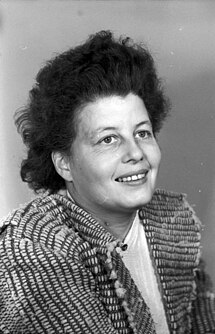 W
WFriedel Apelt was a German political activist, trades union official and politician (KPD/SED). During the Nazi years she participated actively in anti-fascist resistance, and spent much of the time in prison or as a concentration camp internee. After the war she was able to resume her political career in the Soviet occupation zone.
 W
WEdith Baumann was a German politician. She was a co-founder and official of the Free German Youth, the youth organisation that after 1946 became the youth wing of East Germany's ruling Socialist Unity Party . Between 1946 and her death she was a member of the country's powerful Party Central Committee.
 W
WHilde Benjamin was an East German judge and Minister of Justice. She is best known for presiding over a series of political trials in the 1950s. She is particularly known as responsible for the politically motivated prosecution of Erna Dorn and Ernst Jennrich. In his 1994 inauguration speech German President Roman Herzog mentioned Benjamin's status as a symbol of injustice, noting that her name was incompatible with the German constitution and the rule of law.
 W
WPaula Hertwig was a German biologist and politician. Her research focused on radiation health effects. Hertwig was the first woman to habilitate at the then Friedrich-Wilhelms-Universität Berlin in the field of zoology. She was also the first biologist at a German university. Hertwig is one of the founders of radiation genetics alongside Emmy Stein. Hertwig-Weyers syndrome, which describes oligodactyly in humans as a result of radiation exposure, is named after her and her colleague, Helmut Weyers.
 W
WElse Merke was a member of the State Council of East Germany, the country's collective head of state, from 1963 until 1971.
 W
WIrmgard Neumann was a member of the State Council of East Germany, the country's collective head of state.
 W
WMaria Rentmeister was a German political activist who became an anti-government resistance activist after 1933. She spent much of the time during the twelve Nazi years abroad or, later, in state detention. In 1945 she relocated to what now became the Soviet occupation zone where she became the first General Secretary of the politically important Democratic Women's League .
 W
WIlse Rodenberg was a Hamburg typist who became an actress and, later, an influential East German theatre director. She combined this with a political career, sitting as a member of the East German parliament ("Volkskammer") for four decades between 1950 and 1990. She was a member not of the ruling SED (party) but of the National Democratic Party of Germany , one of the smaller Block Parties which contributed a semblance of pluralism to the country's political structure.
 W
WWilhelmine Schirmer-Pröscher was an East German politician of the Liberal Democratic Party of Germany who gained some measure of importance in her nation.
 W
WElli Schmidt was a German communist political activist with links to Moscow, where as a young woman she spent most of the war years. She returned in 1945 to what later became the German Democratic Republic where she pursued a successful political career till her fall from grace: that came as part of a wider clear out of comrades critical of the national leadership in the aftermath of the 1953 uprising. She was formally rehabilitated on 29 July 1956, but never returned to mainstream politics.
 W
WIlse Thiele was an East German politician. She was a member of the powerful Central Committee of the country's ruling SED (party) between 1954 and 1989. She served as the Chair of the national Democratic Women's League from 1953 till 1989.
 W
WRosel Walther was a German politician who was a member of the Volkskammer and the State Council of East Germany.